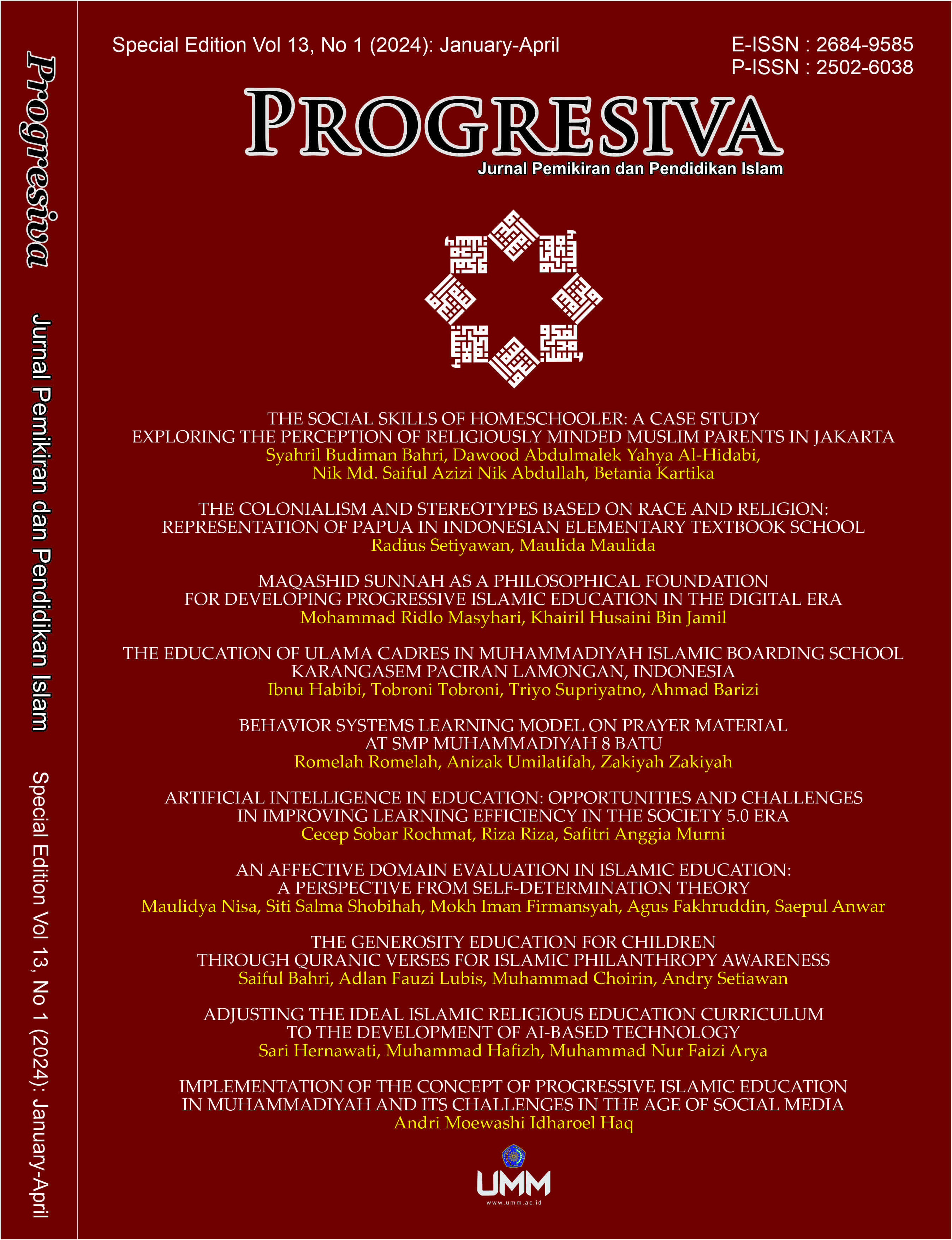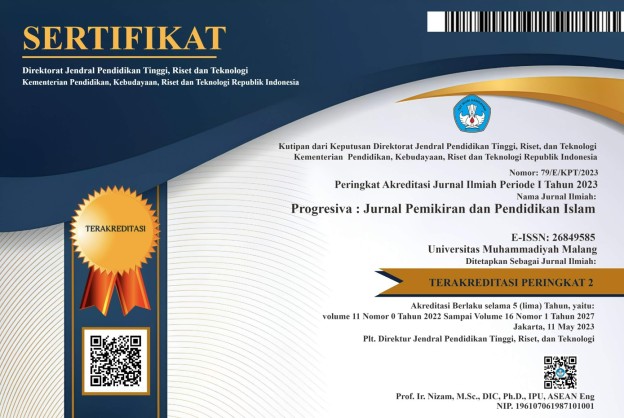The Education of Ulama Cadres in Muhammadiyah Islamic Boarding School Karangasem Paciran Lamongan, Indonesia
DOI:
https://doi.org/10.22219/progresiva.v13i01.30570Keywords:
Islamic Education , Islamic Movement , MuhammadiyahAbstract
This research analyses the education of ulama cadres at the Muhammadiyah Islamic Boarding School, Karangasem Paciran Lamongan. This research uses a qualitative descriptive method with a case study approach. The techniques used in collecting data were observation, interviews, and documentation. Checking the validity of the data by triangulating sources and methods. Meanwhile, data analysis includes condensation, presentation, verification, and conclusion. The results of the research concluded: First, the concept of Ulama in Muhammadiyah Islamic boarding schools is to have professional competence, personal competence, social competence, and spiritual competence. Second, the strategy used by Islamic boarding schools to carry out education for ulama cadres is (a) education and training carried out in formal education and Islamic madrasas; (b) encouragement to memorize the Qur'an; (c) familiarization with students' activities; (d) field practice for preaching in the community. There are two variants in the education of ulama cadres, namely genetic and social theory (3). The educational implications of Muhammadiyah Islamic boarding school ulama cadres are (a) the existence of beneficial community service activities through da'wah weeks and field da'wah service; (b) there is an increase in the Islamic boarding school's clerical competence; (c) there is high satisfaction and trust in the community towards graduates of the two Islamic boarding schools, making it easier for graduates to play an active role in empowering the community, especially in the religious sector.
Downloads
References
Agama, Lajnah Pentashihan Mushaf al-Qur’an Badan Litbang dan Diklat Kementrian. 2012. Al-Qur’an Dan Isu-Isu Kontemporer II (Tafsir Al-Qur’an Tematik). Jakarta: Lajnah Pentashihan Mushaf al-Qur’an.
Arifuddin, Ismail. 2018. “Efektivitas Pendidikan Kader Ulama di Berbagai Pesantren.” Al-Qalam 12(1): 19.
Basyir, Ahmad Azhar. 1985. “Konsep Ulama Muhammadiytah, Keberadaan Majelis Tarjih Dan Kaderisasi Ulama.” In Surakarta.
Dhofier, Zamakhsyari. 1982. Tradisi Pesantren. Jakarta: LP3ES.
Fauzan, Ihsan Ahmad. 1993. Pondok Karangasem, Prespektif Kesejarahan dan Kelembagaaan. Lamongan: Biro Administrasi Informasi dan Lembaga Pendidikan Komputer Karangasem.
Ghozali, Imam. 2022. “Pola Kepemimpinan Organisasi Muhammadiyah.” Murabbi : Jurnal Ilmiah dalam Bidang Pendidikan 5(1): 1–17.
Hidayat, Syamsul. 2015. “Penguatan Kaderisasi Ulama.” Republika.
Horikoshi, Hiroko. 1976. Kiai Dan Perubahan Sosial. Jakarta: P3M.
Imran, Rosyadi. “Argumen Perlunya Dibentuk Majelis Pesantren.” Warta Ma’had Muhammadiyah, edisi Khusus Muktamar: 14.
J. Taylor, Steven, Robert Bogdan, and Marjorie L. 2016. Introduction Qualitative Research Methods: A Guidebook and Resource. Fourth. Hoboken, New Jersey: John Wiley & Sons, Inc.
K. Denzin, Norman, and Yvonna S. Lincoln. 2005. The SAGE Handbook of Qualitative Research. 3rd Ed. Thousands Oaks: Sage Publications.
K.Yin, Robert. 2003. Case Study Research: Design and Methods 3rd Ed. Thousands Oaks, Calif: Sage Publications.
Makmur, Ahdi. 2016. Ulama Dan Pembangunan Sosial. Yogyakarta: Pressindo.
Miles, Matthew B, A. Michael Huberman, and J Saldana. 2014. Qualitative Data Analysis, A Methods Sourcebook. 3rd ed. USA: Sage Publications.
Miswanto, Agus. 2019. “Eksistensi Pesantren Muhammadiyah Dalam Mencetak Kader Persyarikatan (Studi Di Kabupaten Magelang).” Tarbiyatuna 10(1): 81–102. https://doi.org/10.31603/tarbiyatuna.v10i1.2717 .
Muhammadiyah, Lembaga Pengembangan Pesantren Muhammadiya (LP2M) Pimpinan Pusat. 2022. Profil Pesantren Muhammadiyah. Lembaga Pengembangan Pesantren Muhammadiya (LP2M) Pimpinan Pusat Muhammadiyah.
Nashir, Haedar. 1994. Materi Induk Perkaderan Muhammadiyah. Yogyakarta: Badan Pendidikan Kader PP Muhammadiyah.
Rahardjo, M. Dawam. 1996. Ensiklopedi Al-Qur’an : Tafsir Sosial Berdasarkan Konsep-Konsep Kunci. Jakarta: Paramadina.
Rahardjo, Mudjia. 2010. Jenis Dan Metode Penelitian Kualitatif.
Rahmawati, Rukhaini Fitri. 2016. “Kaderisasi Dakwah Melalui Lembaga Pendidikan Islam.” Tadbir: Jurnal Manajemen Dakwah 1(1): 147–66.
Rakornas, Ketua Panitia. 2016. Laporan Ketua Panitia Rakornas Pesantren Muhammadiyah Se- Indonesia Pada Tanggal 28-30 Oktober 2016. Makassar.
Shihab, Alwi. 1998. Membendung Arus Respons Gerakan Muhammadiyah Terhadap Penetrasi Missi Kristen Di Indonesia. XI. Bandung: Mizan.
Steenbrink, Karel A. 1986. Pesantren Madrasah Sekolah: Pendidikan Islam Dalam Kurun Modern. eds. A Mudatsir, EBA, and Abdurrahman. Jakarta: Dharna Aksara Perkasa.
Sugiyono. 2010. Metode Penelitian Pendidikan Pendekatan Kuantitatif, Kualitatif, Dan R&D. Bandung: Alfabeta.
Syafril, and Zelhendri Zen. 2017. Dasar-Dasar Ilmu Pendidikan. Jakarta: Kencana.
Wahab, Muhbib Abdul. 2021. “Pengembangan Pesantren by Design (Kultur Muhammadiyah.” Pengasuh Pesantren Indonesia : Membela dan Memperkuat Pesantren: 1. https://p2i.ponpes.id/?p=317.
Zarkasyi, K.H. Imam. 1978. Diktat Khutbah Al-Iftitah Dalam Pekan Perkenalan. Ponorogo: Darussalam Gontor.
Downloads
Published
How to Cite
Issue
Section
License
Copyright (c) 2024 Ibnu Habibi, Tobroni Torbroni, Triyo Supriyatno, Ahmad Barizi

This work is licensed under a Creative Commons Attribution-ShareAlike 4.0 International License.


















